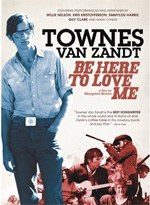 BUY IT AT AMAZON: CLICK HERE!
BUY IT AT AMAZON: CLICK HERE!
STUDIO: Palm Pictures
MSRP: $24.98
RATED: NR
RUNNING TIME: 100 Minutes
SPECIAL FEATURES:
• Commentary by director Margaret Brown, cinematographer Lee Daniel and musician Joe Ely
• Rare and intimate performances by Townes Van Zandt and others
• Exclusive in-depth interviews with featured artists
• Theatrical Trailer
The Pitch
"It’s a documentary about Townes Van Zandt. No, he wasn’t in Lynyrd Skynyrd."
The Humans
Townes Van Zandt in rare footage; the revenant of Kris Kristofferson, various Van Zandt friends and family, Emmy Lou Harris
The Nutshell
Sometimes I don’t know where this dirty road is taking me
Sometimes I can’t even see the reason why
I guess I keep on gamblin’, lots of booze and lots of ramblin’
It’s easier than just a-waitin’ ’round to die
– Townes Van Zandt, Waiting Around to Die
The Package
Be Here to Love Me isn’t jam-packed with extras, but considering the relative lack of fame of the subject and the lack of notice of the film in its limited theatrical release, what we end up with is a hefty helping of footage and info.
Director Margaret Brown provides commentary, along with cinematographer Lee Daniel and musician Joe Ely. The commentary is dryly informative, but to me the real bonus features here are some complete Townes performances, including one that looks like it was shot for a cable access show or something. If you like neohippie Devandra Banhart, he does a cover here – I personally can’t stand the guy’s voice. Rounding out the features are bonus and extended interviews; they’re interesting, but not something I see myself revisiting.
The film itself looks fine – plenty of the material is vintage, so as is usually the case with documentaries things can get a bit dirty. The sound is pretty nice, although that also depends on the source – the phone interview that weaves its way throughout the film has a warmly tinny sound that recalls pre-digital telecommunications.
The Lowdown
Townes Van Zandt sits in his dingy trailer with some friends, smoking, drinking and playing his guitar. As he launches into Waiting Around to Die, one of his earliest songs, one of his guests – an old black man – begins to tear up. Finally the man just breaks down, sobbing.
It’s an incredible illustration of the power of music, especially the music of Townes Van Zandt. In many ways it’s the most important moment in Be Here to Love Me, because it allows the film to show us why Townes is worth a movie, instead of just having a stream of talking heads tell us. It’s the scene that makes the film, since it’s very likely most people have never heard of the man – throughout his life Townes Van Zandt never scored a hit for himself. Occasionally a song he wrote would do well for someone else (like Willie Nelson with Pancho & Lefty), but Townes struggled on the very edges of the music industry, sometimes unable to get his records released at all.
In a lot of ways the story of a musical genius is a cliché – it’s a person with an astonishing gift for expression through music, a gift that’s almost supernatural in its strength, and yet that person almost always has a streak of self-destruction that threatens not just the gift but his or her life. The story of Townes Van Zandt isn’t all that different from the stories of other musical geniuses, with the exception that he never made it big, and so his story offers another side of the struggle between the gift and the self-destruction. One of the thing I wish Be Here to Love Me had explored more was why Townes never hit the big time – his music, as we can tell from listening to the all-too-short bits played in the movie, was great, and his country/folk sound wasn’t so removed from the time he lived in that audiences couldn’t understand it. To me the tragedy of Townes Van Zandt is that he had a little more self-destruction than he had ambition – the ones who make it huge before imploding are programmed a little differently.
One of the weaknesses of Be Here to Love Me is the lack of good Townes footage. Because he never made it big, he wasn’t as well documented as some of his peers, so we end up having to discover the man through the recollections of those who knew him. The bits of original documentation that is available – a recorded phone interview, some footage of Townes drunk and fooling around with guns in front of his rundown trailer home – is revealing, but at the end of the film I didn’t feel like I really knew who Townes Van Zandt was. And maybe that’s not something that can be discovered outside of his heartbreaking music.
8.8 out of 10